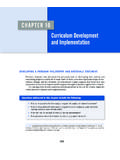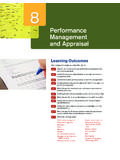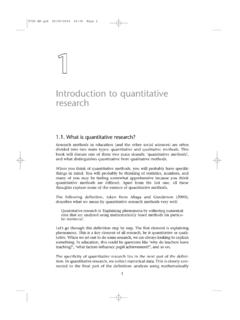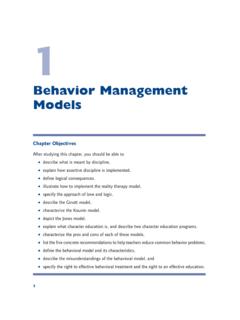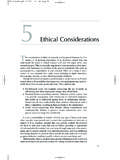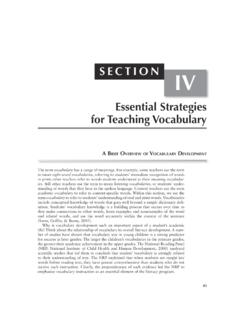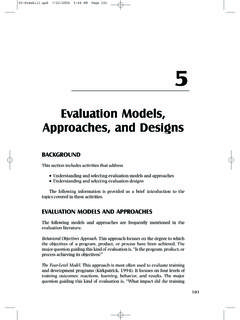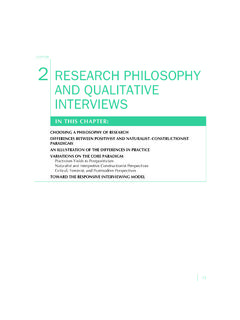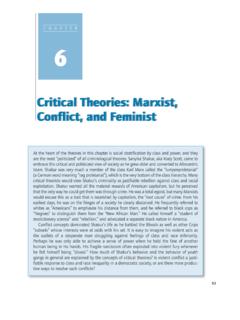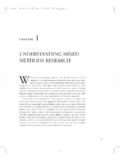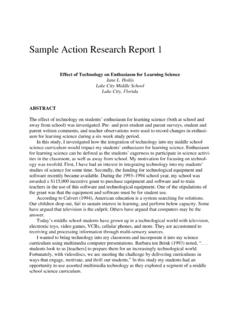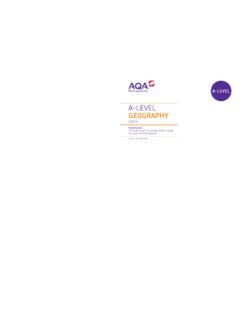Transcription of Chapter 2
1 Chapter 2Id e n tI f y I n g a Re s e aR c h PR o b l e m a n d Qu e s tI o n, a n d se aR c hI n g Re l e v a n t lI t e R a t uR eLong before you create a research proposal, let alone conduct your research, you need to identify a problem to address and then a question or questions to ask regarding your targeted problem. This Chapter first discusses the nature of a research problem, where you might get ideas for a problem to investigate, narrow-ing down or focusing on a particular problem to address, and writing good research questions. It then discusses finding literature that is relevant to and helpful in clarifying your targeted problem and question(s).
2 21In this Chapter , the reader willunderstand the characteristics of a research problem or phenomenon. understand the characteristics of good research questions. clarify the difference between a research problem and hypothesis. understand the purposes of a literature review. understand the process for conducting a literature search. Chapter ObjeCtives22 co n d u c tI n g ed u c a tI o n a l Re s e aR c hId e n tI f y I n g a Re s e aR c h PR o b l e m We often think we understand problems when we don t. For example, when students encounter difficulties with word problems in math, teachers may initially think that students have not mastered the basic skills that would allow them to carry out the needed computations.
3 However, the difficulty may actually lie in poor reading skills, which prevent the students from identifying the words in math problems. As another example, when students do not hand in homework assignments or participate in class, some might be inclined to think that the students are not moti-vated. While there may be motivational issues, motivation may not be the only factor. A high school student may have an evening job that demands considerable time and energy. A younger student may be trying desperately to camouflage poor or nonexistent skills. In some cases, the chosen instructional strategy may not be well matched to the student s cognitive or attention level.
4 Therefore, it is crucial that researchers accurately identify the problem they want to Is a Research Problem?A research problem, or phenomenon as it might be called in many forms of qualitative research, is the topic you would like to address, investigate, or study, whether descriptively or experimentally. It is the focus or reason for engaging in your research. It is typically a topic, phenomenon, or challenge that you are inter-ested in and with which you are at least somewhat Do You Find a Problem or Phenomenon to Study?Since a research problem is usually something you have some knowledge of, that personal experience is often a good starting point.
5 Realistically, you have to select something that you are interested in, because you are going to commit yourself to a significant investment of time and energy. Thus, if you are not personally interested, it will be difficult to sustain the effort needed to complete the research with any measure of quality or validity. You may want to talk to teachers, counselors, admin-istrators, psychologists, or others about some of the problems they face. For exam-ple, your ideas may come out of experiences like Johnny s shout outs, Madeline s reading rate, or Esmerelda s trouble with math that were discussed in Chapter 1. You may find an interesting idea that way and, in addition, address something that may have social significance beyond your research project, thesis, or dissertation.
6 Moreover, by addressing the questions of practicing educators, you may develop important relationships with future research partners and 2 Identifying a Research Problem and Question 23 Narrowing or Clarifying Your Problem FocusA problem statement such as Students can t read, is not clear because many aspects of reading, including discrete reading skills and strategies, may contribute to reading difficulties. Alternatively, Students cannot find the main ideas in read-ing passages, is much clearer and potentially much easier to measure and address, since one can define main idea and determine student performance related to this behavior in a number of whether in the classroom, the physician s office, or the mechanic s shop, defining or diagnosing a problem is key to designing and implementing effective interventions to address it.
7 Without adequately defining the problem, researchers may find themselves going off on a goose chase to tackle a vague phenomenon, trying to deal with symptoms rather than root causes, and wasting time, becoming frustrated, or even making the actual problem in this Chapter , you will read about the use of standardized test scores for entrance to undergraduate or graduate school as an example research topic. While that may be a good topic, it is not well defined; it needs to be narrowed by thinking about the kind of information that the researcher wants to find out. Whether you are interested in the kinds of tests that are used, the average cutoff scores, or the degree to which scores predict college grade point average, as examples, a topic has to be specific enough to be clearly defined and yield helpful results from a later literature search.
8 Id e n tI f y I n g a Po s sI b l e Re s e aR c h Qu e s tI o nAfter you have narrowed down your topic or problem, searching and reviewing existing literature may further clarify your research approach. Moreover, by identifying where the conclusions of previous research are unclear or where gaps may exist in the literature, you will be better prepared to write good research Is a Research Question?A research question is a way of expressing your interest in a problem or phenomenon. Research questions are not necessarily an attempt to answer the many philosophical questions that often arise in schools, and they are certainly not intended to be an avenue for grinding personal axes regarding classroom or school issues.
9 You may have more than one research question for a study, depending on the complexity and breadth of your proposed work. Each ques-tion should be clear and specific, refer to the problem or phenomenon, reflect 24 co n d u c tI n g ed u c a tI o n a l Re s e aR c han intervention in experimental work, and note the target population or par-ticipants (see Figure ). Identifying a research question will provide greater focus to your research or clarify the direction of your investigation, whether the research is descriptive or experimental. Quite significantly, a well-written research question will also shed light on appropriate research methods ( , specify the intended actions of the variables and how an experimental inter-vention might be measured).
10 Characteristics and Examples of Good Research QuestionsGiven the characteristics of good research questions noted in Figure , let s take a look at some examples, and nonexamples, of good research questions. Table illustrates a few of each type and includes explanations of why a researcher would categorize them as one or the are some additional examples of good experimental research questions from existing literature:Will the use of the Self-Regulated Strategy Development model for written expression improve the composition skills of students with ADHD (Reid & Lienemann, 2006)?Would students in classrooms of teachers receiving professional develop- ment in early literacy skills show greater gains in cognitive development when compared to those in control classrooms (Landry, Swank, Smith, Assel, & Gunnewig, 2006)?
